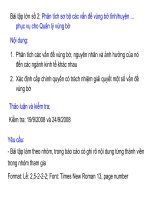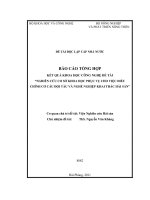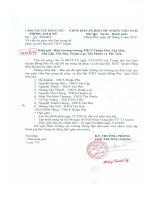bài hát 3 phục vu cho bài vt đề tài bộ đọi
Bạn đang xem bản rút gọn của tài liệu. Xem và tải ngay bản đầy đủ của tài liệu tại đây (120.44 KB, 6 trang )
<span class='text_page_counter'>(1)</span><div class='page_container' data-page=1>
<i><b>Unit 14: RECREATION</b></i>
<i><b>Part A:</b></i><b> Reading</b>
<i><b>Guiding teacher: </b></i><b>Ngo Thi Huyen</b>
<i><b>Trainee teacher:</b></i><b> Phung Thi Mai</b>
<i><b>Date of preparation</b></i><b>: 29/03/2010</b>
<i><b>Date of teaching</b></i><b>: 31/03/2010</b>
<i><b>Period:</b></i><b> The 2nd</b>
<i><b>Class:</b></i><b> 11B2</b>
<b>A. Preparation:</b>
<b>I. Aims and objectives:</b>
By the end of the lesson, students will be able to:
- Improve their reading skill
- Get more information about the British’ leisure activities.
<b>II.Language:</b>
- Words and phrases relating to the lesson:
+ Pastime
+ House hold
+ Apart from
+ Sophisticated
+ Engrave
<b>III.Skills</b>:
Integrated skills:
- Focus skill: Reading
- Other skill: Speaking, listening, writing
<b> IV. Method:</b>
Communicative approach.
<b>V. Techniques:</b>
- Question and answer.
- Pair work, group work, and individual work
- Repetition.
- Explanation.
<b>VI. Teaching aids:</b>
</div>
<span class='text_page_counter'>(2)</span><div class='page_container' data-page=2>
<b>Teaching</b>
<b>steps and</b>
<b>time location</b> <b>Teacher’s activities</b> <b>Students’ activities</b>
<b>I/</b>
<b>Stabilization:</b>
<b>(1’)</b>
<b>II/</b>
<b>Checking up</b>
<b>III/</b>
<b>Presentation of</b>
<b>the new lesson</b>
<b>(41’)</b>
- Greets students
- Checks the attendance.
- Calls 2 students to go to the board and to do
this exercise:
Write the following sentences, paying
attention to the subjects of the sentences, the
objects of the verbs and the adverbials of the
sentences:
1.My mother bought me the red skirt on my
birthday.
2.The boy meets his friend this morning.
- Gives the feedback and marks.
<b>1/ Lead in: (7’)</b>
- Asks students some questions:
<i>+ What would you like to do in your free </i>
<i>time?</i>
<i>+ You usually enjoy these activities with </i>
<i>whom?</i>
<i>- Shows pictures of some leisure activities </i>
( shopping, playing games, fishing, listening
music, watching TV, swimming…) and asks
students :
+ Do you think the British people
<i><b>Mini game:</b></i>
- Invites 6 students to go to the board and play
the game. Teacher will divides them into 2
groups, delivers each group 5 pictures of
some collections ( money, stamps, butterflies,
shoes, books, toys)
- Tells the rule: Teacher will read aloud the
- Greet the teacher
- The monitor answers teacher’s
question.
- Answer teacher’s question.
<b>Expected answer:</b>
<i>1/</i>
<i>- It was my mother who bought me </i>
<i>the red skirt on my birthday.</i>
<i>- It was the red skirt which/ that my</i>
<i>mother bought me on my birthday.</i>
<i>- It was on my birthday that my </i>
<i>mother bought me the red skirt.</i>
<i>2/</i>
<i>- It is the boy who meets his friend </i>
<i>this morning.</i>
<i>- It is his friend whom/ that the boy </i>
<i>meets this morning.</i>
<i>- It is this morning that the boy </i>
<i>meets his friend.</i>
- Do as teacher said
- Listen to the rule carefully.
- Play the game.
</div>
<span class='text_page_counter'>(3)</span><div class='page_container' data-page=3>
name of collections one by one. The students
of each group will go to the board as fast as
possible to paste the right one on the board.
The faster group having correct answers will
be the winner.
- Lets students play the game.
- Gives feedback and declares the winner.
- Leads to the new lesson: “ Today, we are
going to write paragraphs about collections.
Now, we come to part D: Writing.
<b>2/ Pre-writing: (7’)</b>
- Introduces some new words and phrases:
+ tobe crazy about = tobe very interested in.
Ex: Thuy Chi is my favorite singer. I am
crazy about her.
+ provide someone with something (v)
= provide something for someone (v)
Ex: Forests provide us with wood.
= Forests provide wood for us.
+ enable someone to do something (v)
Ex: Her good English enable her to get a good
job.
- Reads aloud these phrases and asks students
to repeat.
- Asks some students read aloud these phrases
again.
<b>3/ While writing</b>: <b>( 28’)</b>
<b>Activity 1: ( 10’)</b>
- Asks students : “ When you are interested in
someone’s collection, what would you like to
know?”
- Elicits ideas from students (*):
- Listen to the teacher to guess the
meaning of these words and take
note in their notebooks.
- Listen and repeat.
- Some students read aloud these
phrases again
- Answer the teacher’s questions
<b>Expected answer:</b>
When I’m interested in someone’s
collection, I would like to know:
+ The name of the collection.
(collection of books, coins,
stamps, clothes...)
+ How he collects them (buy them,
ask some one to give them,
exchange them)
+ How he keeps them.
(in album, on shelves, in boxes, in a
safe...)
+ When he started his collection.
(last year, 6 years ago, long ago)
+ How he classifies them.
(into categories, countries,
ages, colors...)
+ Why he collects them.
(to relax, to kill time, to
entertain oneself)
+ His plan for the future (continue
to collect...)
</div>
<span class='text_page_counter'>(4)</span><div class='page_container' data-page=4>
<b>III/</b>
<b>Consolidation:</b>
<b>(1’)</b>
<b>IV/</b>
<b>Homework:</b>
<b>(2’)</b>
<b> Activity 2: ( 12’)</b>
- Asks students to work in groups, to look at
all ideas suggested on the board and to write
about their collections, real or image, using
the ideas mentioned above.
- Hangs the paperboard consisting the sample
writing about a stamp collection (**)
- Goes around to offer help.
- Calls one or two groups hang their
paragraphs on the board, corrects the
mistakes.
- Gives feedback on students’ writings.
<b> Activity 3: (6’)</b>
- Gives handout ( ***) about a hobby to
students and asks them to work in groups of
4 to find out the mistake in the essay given
within 3 minutes, adding that there is only
one mistake in each paragraph.
- Calls the fastest group answers and corrects
the mistakes.
- Gives feedback.
- Retells the main points of the lesson today.
- Asks students to answer the following
questions about the reading text given in the
activity above, reminding them fo write their
on the board to write about their
collections.
- Look at the sample writing.
- Hang their writings on the board.
- Listen to the teacher.
- Receive the handouts, listen to the
teacher then work in groups of 4 to
find out the mistakes.
- The fastest group answers and
corrects the mistakes.
<b>Expected answers:</b>
<i><b>+ Paragraph 1: </b></i>
Learn – to learn
<i><b>+ Paragraph 2:</b></i>
Happen- happening
<i><b>+ Paragraph 3:</b></i>
Although- because
- Listen to the teacher.
- Listen to the teacher.
</div>
<span class='text_page_counter'>(5)</span><div class='page_container' data-page=5>
work on their exercise notebooks.
<b>Questions</b>
Read the text in the activity above again and
answer these questions
1. What's the writer hobby?
2. When did he start it?
3. How useful is the TV set to the writer?
4. Do you share the ideas about
watching TV with the writer? Why (not)?
<i><b>Supplement (*):</b></i>
<i><b>My Hobby</b></i>
My hobby is collecting stamps. This hobby started when I was a little boy. I often
buy them from the post office. Sometimes, I ask members of family, friends,
relatives and even the postman to give me some. I also make friends with people
overseas and exchange stamps with others. I classify stamps into different
categories: animals, plants, birds, landscape and people. I keep each of category in
a mini album to enable me to see them anytime. Collecting stamps is a good hobby
because it provides me knowledge about landscape, people, animals, plants and
tree. I think I will continue to collect to help my collection richer and richer
</div>
<span class='text_page_counter'>(6)</span><div class='page_container' data-page=6>
<i><b>Supplement (**):</b></i>
<i>One of my hobbies is watching TV. My hobby started when I was a boy of five. I </i>
<i>would always ask my parents to turn on the TV set so that I could enjoy the </i>
<i>cartoon films or advertisements. Now 1 find that watching TV enables me learn </i>
<i>many things. I learn a lot about how people lived in the old times. I learn about </i>
<i>the wonders of the world, space travel, tiny viruses and other fascinating things.</i>
<i>TV programs provide me with so many information and facts. I can stay at home </i>
<i>and watch almost everything happen around me.</i>
<i>I think I will continue to watch TV although TV programs are always useful to </i>
<i>me. Watching TV is actually a good hobby.</i>
collection
Name of the collection.
(collection of books,
coins, stamps, clothes...)
How to collect them (buy
them, ask some one to
give them, exchangethem)
How he keeps them.
(in album, on shelves, in
boxes, in a safe...)
When he started his collection.
(last year, 6 years ago, long
ago)
How to classify them.
(into categories,
countries, ages, colors...)
+ Why he collects them.
(to relax, to kill time, to
entertain oneself)
</div>
<!--links-->









